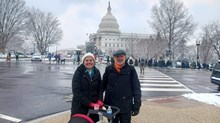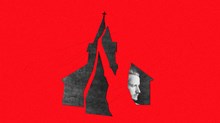My friend Dean's list of interests on his facebook profile reads as follows: "Interests: You Name It. The World Is An Interesting Place." I tend to share Dean's expansive interests, which partially explains why on a day when I could have blogged about yesterday's ruling allowing gay marriages in California, the global food crisis, continued gnashing of teeth regarding the Evangelical Manifesto, or the critical response to the latest Narnia film that opens this weekend, I'm instead drawn to this Houston Chronicle story about Lone Star Cowboy Church in Montgomery, Texas.
I'm admittedly a latecomer to the cowboy church phenomena, which was reported on in the pages of our magazine some five years ago. And upon reading that Lone Star has its own rodeo arena, which was built almost as soon as the tent church that served the congregation for the first two years, it's tempting to dismissively file the whole movement under news of the weird, as an odd bit of cultural ephemera spun out of American evangelical subculture machine. Yet the Chronicle article also indicates that Lone Star has over 1300 members, and that there are more than 100 churches linked with the Baptist General Convention's Texas Fellowship of Cowboy churches alone. (I highly recommend you take a look at this map, which plots cowboy churches in the Fellowship.)
Clearly, something is going on here, but what? How should we understand what's happening at Lone Star and in the larger movement? Does it represent the expansion of the gospel through the faithful translation of Christianity into the everyday cultural forms of a distinct subcultural people group–an exercise in removing unnecessary barriers and becoming "all things to all people"? Or, does it represent the collapse of the Christian gospel and message into the world of meaning provided by the mythos, language, and forms of the American West's cowboy culture?
While I'm confident the truth lies somewhere between these two poles, it's hard to say where, though I'm definitely nervous about what appear to be the "tribal" markers that bind the movement and its churches together. These tribal dynamics are also clearly on display in other subcultures that have produced churches or movements, such as biker culture, surf culture, or the hippie culture of the 60s and 70s. When churches begin to look like affinity- or interest- groups, and less like God's extraordinary project to transcend cultural divisions by uniting a diverse and motley lot under the the Lordship of God's Christ, the gospel has been diminished. In Christ, there is neither cowboy nor yuppie, biker nor gamer, farmer nor techie. All are one in Christ Jesus.
In an American free-market, voluntary church environment, we'd all do well to scan the pews (or hay bales) of our own churches and see who we've joined ourselves to. My hunch is that we'd find we're probably not much different than our cowboy brothers and sisters in seeking out our cultural kin.

Support Our Work
Subscribe to CT for less than $4.25/month


















